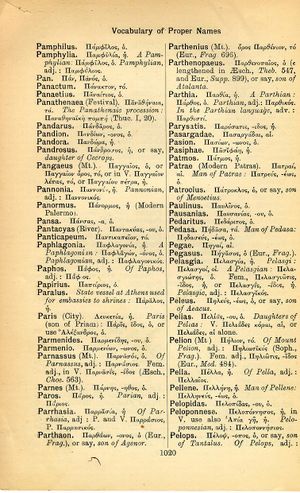Pandion
αἰὲν ἀριστεύειν καὶ ὑπείροχον ἔμμεναι ἄλλων → always strive for excellence and prevail over others (Iliad 6.208, 11.784)
English > Greek (Woodhouse)
Πανδίων, -ονος, ὁ.
Latin > English (Lewis & Short)
Pandīon: ŏnis, m., = Πανδίων.
I A king of Athens, father of Progne and Philomela, Hyg. Fab. 48; Ov. M. 6, 426; 676: Pandionis populus, i. e. the Athenians, Lucr. 6, 1143: Pandione nata, i. e. Progne, Ov. M. 6, 634.—Transf., for the nightingale, Ov. P. 1, 3, 39: Cecropiae Pandionis arces, Mart. 1, 26, 3.—Hence,
B Pandīŏnĭus, a, um, adj., Pandionian: Pandioniae Athenae, Ov. M. 15, 430: Pandionia Orithyia, the sister of Pandion, Prop. 1, 20, 31: res Pandioniae, the Athenian state, Claud. IV. Cons. Honor. 506: arces, the citadel of Athens, id. Rapt. Pros. 2, 19; also called mons, Stat. Th. 2, 720: volucres, the nightingale and the swallow, Sen. Octav. 8: cavea, the Athenian theatre, Sid. Carm. 23, 137.—
II A son of Jupiter and Luna, Hyg. Fab. praef.

